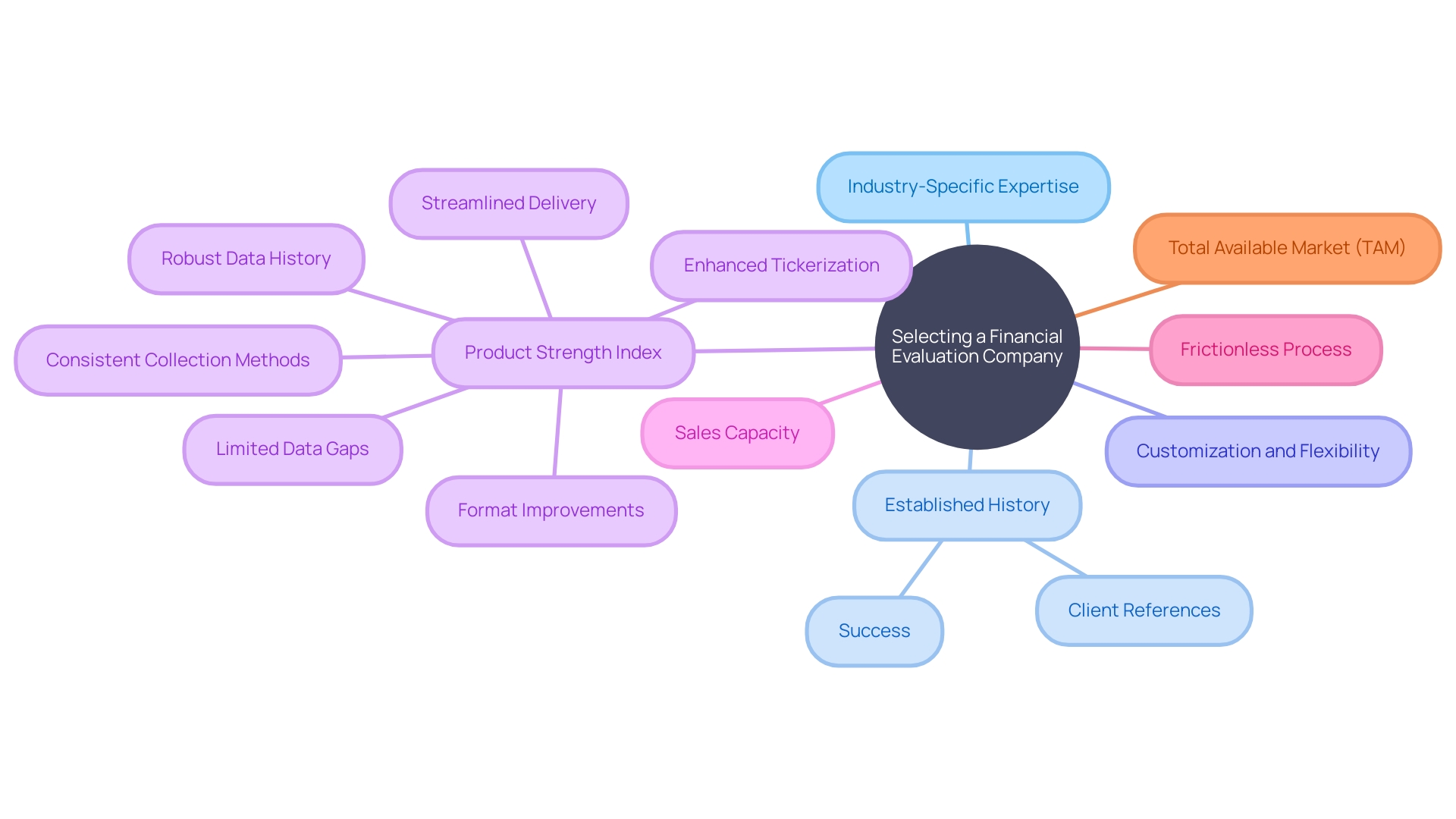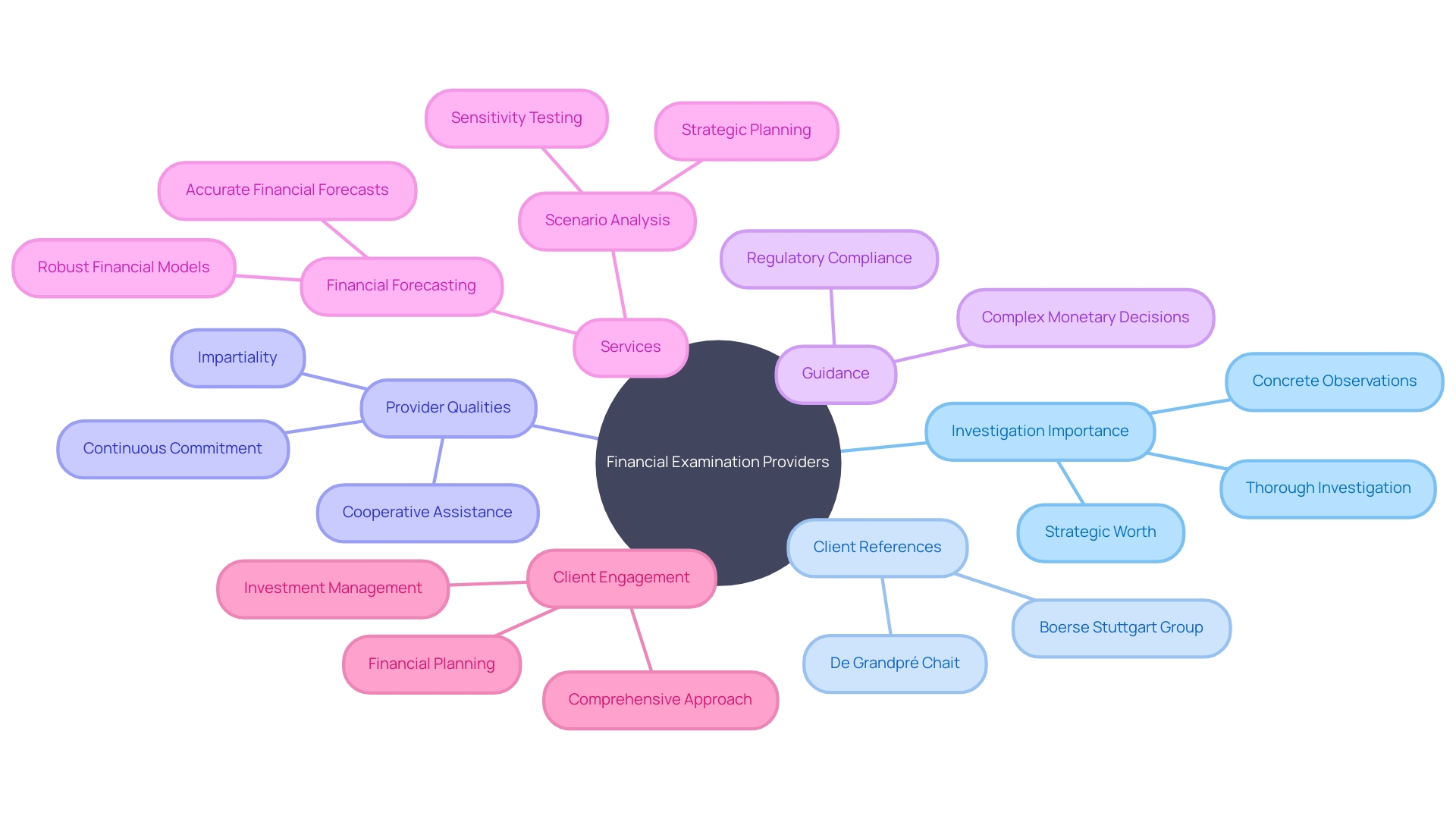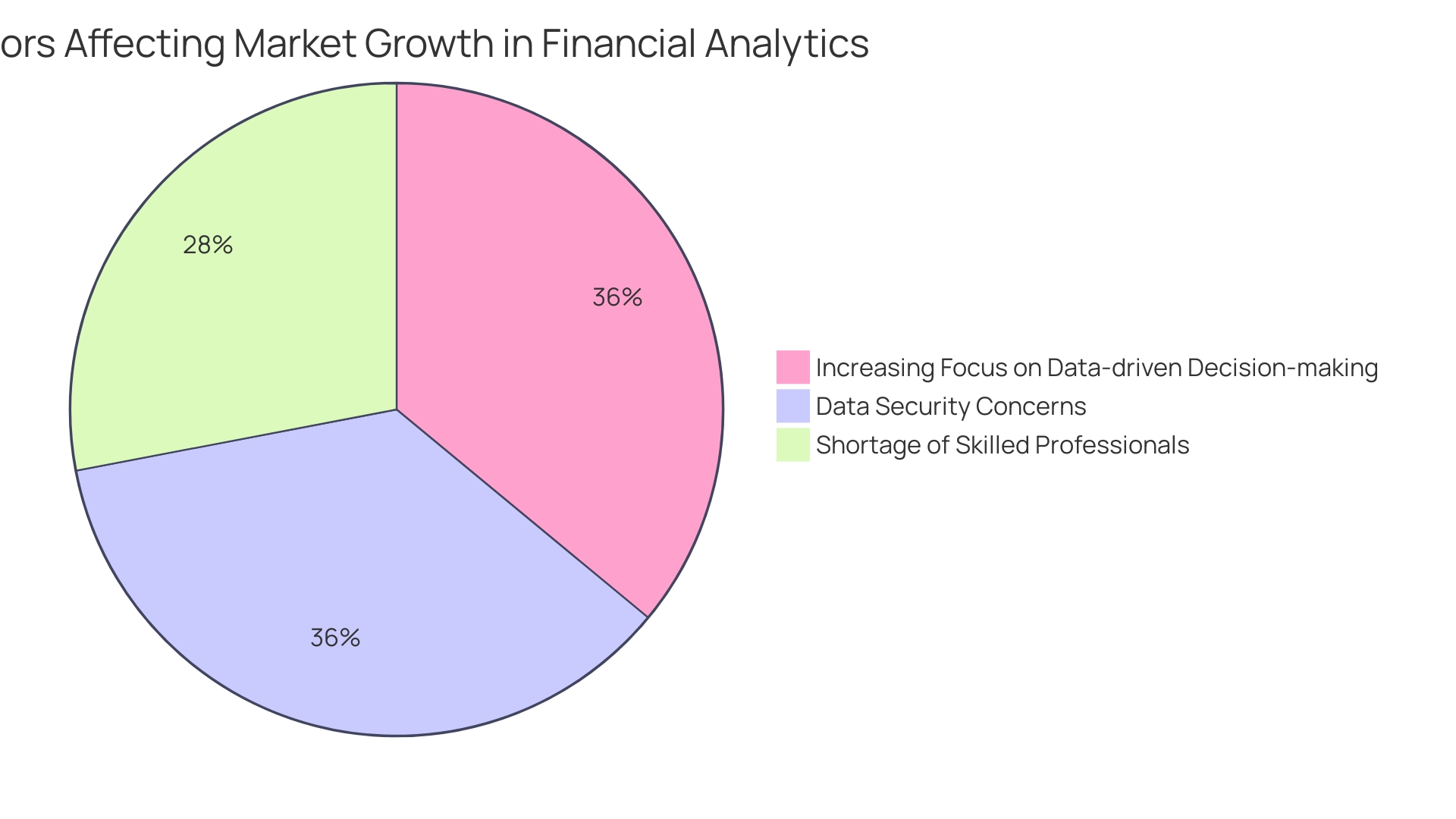Introduction
Financial due diligence is a critical process that goes beyond a simple financial audit. It involves a thorough examination of a company's operations, financial statements, legal compliance, tax adherence, and IT infrastructure to identify potential risks and issues that could impact business deals, particularly in mergers and acquisitions. This article explores the importance of financial due diligence and provides insights into key factors to consider when choosing a due diligence firm.
It also emphasizes the need for industry-specific expertise, a proven track record, customization, clear reporting, and cost transparency. Furthermore, the article highlights the significance of global reach and regulatory compliance in today's complex financial landscape. Through a case study, it demonstrates the positive outcomes that can be achieved with comprehensive financial due diligence.
Understanding the Importance of Financial Due Diligence
Thorough examination of the various facets of a company's operations goes beyond a simple audit of its finances. This thorough examination encompasses the evaluation of statements, assets, liabilities, cash flow, and future projections, and it seeks to pinpoint any potential risks, legal complications, or tax compliance issues that could influence the outcome of a business deal, particularly in mergers and acquisitions.
The range of monetary investigation encompasses several crucial aspects, each necessary in portraying a comprehensive picture of the target company's health and prospects. These include:
- Financial Health Assessment: Scrutinizing the financial statements to understand the assets, debts, cash flows, and forward-looking financial projections.
- Legal and Regulatory Compliance: Examining the company's adherence to laws and regulations, a step of heightened importance within heavily regulated industries.
- Tax Law Compliance: Ensuring that the target company has been compliant with tax laws through a review of tax returns, past audits, and any tax-related agreements.
- Legal Liabilities: Considering any existing legal liabilities, including partnerships, licensing agreements, and intellectual property such as patents, copyrights, and trademarks.
- IT Infrastructure and Cybersecurity: Evaluating the robustness of the company's IT systems and the measures in place to protect against cyber threats.
A comprehensive investigation process is not just about comprehending the current state of affairs but also about strategically planning for post-merger integration. It is about exploring the relationships with key stakeholders and devising strategies for managing joint ventures and partnerships, as emphasized by M&A experts like Christian Atzler.
Moreover, the significance of careful examination of finances is emphasized by the changing environment of international business deals, like the expansion endeavors of Capital One to establish a competitive worldwide payments network through strategic purchases, thus improving size and investment capacities.
In the ever-changing realm of mergers and acquisitions, real-time intelligence is paramount. Companies need to stay updated on legal, regulatory, and market trends to effectively navigate the intricacies of thorough investigation. With tools like BCG's M&A Sentiment Index, decision-makers now have access to quantified insights that can guide their willingness to pursue deals, providing a statistical gauge of market sentiment over the coming months.
In the end, conducting thorough and comprehensive research is about making well-informed choices that are crucial to the prosperity and expansion of a company, ensuring that every aspect of the target company is carefully examined before a transaction is completed.
Key Factors in Choosing a Financial Due Diligence Firm
Choosing the appropriate financial evaluation company is a crucial choice that can significantly affect the result of any deal. It's not only about the cost of due diligence, but also the depth and relevance of the analysis provided. To ensure a well-informed decision, there are several factors to consider:
-
Industry-Specific Expertise: The complexities and nuances of different sectors demand a firm with specialized knowledge. This expertise is essential for navigating the unique financial landscapes and regulatory environments inherent to each industry. In the case of California utilities and the wildfire risk management, having an organization that comprehends specific industry risks and can assess safety measures against economic trade-offs is invaluable.
-
Established History of Success and Client References: A company's track record can reveal a lot about its capacity to perform thorough due diligence. Search for companies that have a strong history of discovering important financial insights, similar to how the examination of accounting practices exposed significant problems within Archer Daniels Midland's nutrition business. Positive client references can also serve as evidence of a company's reliability and quality of service.
-
Customization and Flexibility: Every deal is unique, with its own set of challenges and requirements. A comprehensive investigation company should provide services that can be customized to meet the specific requirements of your transaction. This flexible approach mirrors the adaptability seen in frontier AI labs, where risk management strategies are customized to address rapidly evolving uncertainties.
These considerations are crucial in a monetary landscape that is becoming increasingly complex. With regulatory requirements, such as those involving personal data and privacy, becoming more complex, the role of thorough investigation companies is now more important than ever. Companies that utilize cutting-edge technologies such as AI, blockchain, and cloud computing in their compliance duties are paving the way for a more ethical and efficient future.

Evaluating Industry-Specific Expertise
Acquiring the assistance of a firm specializing in careful examination of finances that showcases industry-specific knowledge is essential for navigating the intricate monetary landscapes inherent to diverse sectors. Every sector has its own collection of monetary behaviors, regulatory requirements, and inherent risks that must be carefully grasped. Partnering with a careful examination provider that possesses a seasoned understanding of your target company's industry ensures that they can offer insights that are both valuable and tailored to the specific nuances of the sector.
The selected company must demonstrate not only a thorough understanding of industry-specific metrics and key performance indicators, but also a keen awareness of potential hazards that could impact the outcome of a transaction. Such expertise is pivotal for the identification of any concerning issues or red flags that might otherwise go unnoticed, thereby safeguarding the integrity of the investment.
In the current economic climate, where unexpected occurrences like market disruptions or regulatory changes can quickly influence a company's viability, having a careful evaluation partner with a finger on the pulse of industry trends is crucial. They should have the capability to discern how external factors such as evolving market events or the latest technological advancements might impact the monetary stability of the business in question.
For CFOs, it is crucial to acknowledge the complete range of thorough investigation that goes beyond financial audits. A thorough investigation will cover evaluations of legal and regulatory compliance, tax law adherence, IT infrastructure, and potential legal liabilities. This thorough assessment is vital, particularly in heavily-regulated industries, to identify and address any risks that could jeopardize the company's future.
Ultimately, the firm you select must be able to navigate the intricacies of your industry, armed with a strategic understanding of the current market and the foresight to anticipate future challenges. Their knowledge becomes a vital resource in guaranteeing a careful process that is both comprehensive and tactical, clearing the path for well-informed investment choices that align with your company's long-term monetary goals.
Assessing Proven Track Record and Client References
The significance of choosing a financial examination provider with a strong history and reliable client references cannot be emphasized enough. An organization that has shown its expertise in carrying out thorough investigation, which results in concrete observations and strategic worth for their customers, is priceless. To this end, examining case studies and client feedback is vital for assessing an organization's capacity to detect latent risks, pinpoint opportunities, and offer practical advice. Such careful investigation was evident when De Grandpré Chait, a Canadian legal practice, encountered complexities in handling cases related to cryptocurrency. Their choice of Chainalysis, a company well-known for its high-quality data and dependable software, turned out to be a crucial decision that improved their operational efficiency and client trust. Likewise, the Boerse Stuttgart Group utilized Chainalysis' comprehensive data and AML proficiency to navigate the unpredictable cryptocurrency market and guarantee adherence, demonstrating the importance of a continuous commitment and cooperative assistance from an investigation company. Spruce Point Capital Management LLC's disclaimer also highlights the need for a thorough investigation company that allows clients to make well-informed choices free from undue influence, showcasing the company's dedication to impartiality. With the monetary landscape constantly changing, as observed in the recent strategic shifts of a bank's business model for managing private corporate bonds, the role of a skilled investigation firm becomes even more crucial in guiding companies through complex monetary decisions and ensuring compliance with regulatory changes.

Importance of Clear and Transparent Reporting
Thoroughly examining and interpreting a company's economic well-being is the core of due care, a task that concludes with the creation of a comprehensive report. This document must be both accessible and precise, enabling key decision-makers to swiftly grasp the intricacies and implications for their strategic pursuits. It's paramount that the report delineates potential risks, pinpoints opportunities, and identifies any critical concerns that could influence the outcome of the transaction. By presenting clear, actionable insights, stakeholders are equipped to make well-informed choices. A recent example of such comprehensive reporting is a bank's interim statement, which revealed a strategic shift in the management of a bond sub-portfolio, from a 'held to collect and sell' model to 'held to collect', to fortify capital excess stability. This level of transparency in reporting is imperative to ensure all significant information is effectively conveyed, supporting a streamlined and successful transaction process.
Customization and Flexibility in Due Diligence Services
Customizing thorough investigation services is not just an additional advantage but an essential necessity for companies involved in distinct transactions. Companies that excel in the financial scrutiny field are those that show a consistent dedication to customization. They take the time to understand a company's distinct objectives and intricacies, considering the scope, timeline, and specific focus areas of the due diligence process. The ability to adapt and align these services with the company's goals is what delivers a truly comprehensive analysis that goes beyond the numbers, echoing the precision seen in the legal sector, such as with De Grandpré Chait's use of Chainalysis for complex cryptocurrency cases, or Boerse Stuttgart Group's collaboration with the same firm for informed compliance and AML decisions.
The development of fintech, as observed with YNAB's budgeting system, has established a standard for services to be seamless, personalized, and accessible on-demand. Dynamic IT services are transforming industries, including services, where the demand for digital banking is driven by tech-savvy consumers. Adopting digital monetary solutions, as emphasized by the advantages of enhanced efficiency through procedure automation, is not only a fad but a strategic shift for institutions aiming to remain competitive. As monetary regulations become progressively intricate, particularly concerning personal information and privacy, the integration of technology such as AI, blockchain, and cloud computing becomes vital. This is not only for compliance but also for maintaining a balance between innovation and responsibility, ensuring services are not only efficient and customer-centric but also ethical and inclusive.
Indeed, the data supports this strategic shift towards technology and customization. A Product Strength Index that factors in data quality and delivery, coupled with a seamless client service process, is integral to revenue growth. Furthermore, organizations are increasingly leaning towards data-driven decision-making, as evidenced by a 2022 S&P Global survey where 25% of participants indicated that nearly all their decisions are informed by data. Firms specializing in thorough investigation of finances who acknowledge and include these patterns into their services are more likely to offer valuable solutions that align with the current financial environment, characterized by a need for well-regulated, data-driven, and customer-centric approaches.

Cost Transparency and Budget Considerations
When sourcing a provider to assess monetary examination, clear cost structures and budget alignment are paramount. The careful investigation process should be approached with a comprehensive understanding of all potential expenses to avoid surprises. Having open and honest discussions with the service provider regarding the fee breakdown, which includes any additional charges or potential cost increases, is vital for a company's planning. By doing this, companies can effectively manage their resources and ensure that they are receiving comprehensive scrutiny services that fit within their monetary framework. It's a delicate balance to maintain—investing in a quality due diligence analysis without compromising on budgetary limitations. For example, think about how a bank recently reorganized its management of private corporate bonds, which affected its reporting and overall business model. This move was partially driven by the need for stability in capital surplus, highlighting the intricate relationship between operational decisions and economic outcomes. Similarly, the risk management approaches for California utilities in response to wildfire threats illustrate the complexities of cost-benefit analysis in risk mitigation strategies. These cases underscore the importance of clarity, as noted by Richard Stone from the AIC regarding the FCA's statement on cost disclosures, which emphasizes the need for transparent and detailed cost information to aid informed decision-making. Ultimately, the objective is to acquire a due care service for finances that provides clarity, pertinence, and precision, empowering companies to navigate through monetary uncertainties with assurance.

Global Reach and Regulatory Compliance
For organizations operating on a global scale, the complex network of regulations, tax laws, and cultural business practices across different jurisdictions requires the expertise of a due diligence company well-versed in international compliance. Such companies play a crucial role in ensuring that cross-border transactions align with local and global standards, streamlining the process and mitigating risk. The worth of such companies is demonstrated by EY, which is dedicated to establishing trust in markets by providing top-notch audits and aiding in navigating economic crises. They have proven that deep understanding and leadership in the field can lead to solving complex challenges for clients worldwide.
In the rapidly evolving landscape of international finance, firms like De Grandpré Chait utilize specialized tools like Chainalysis to address the complexities of cryptocurrency transactions, emphasizing the requirement for state-of-the-art solutions in carefulness. Furthermore, the conflict in Ukraine highlights the crucial significance of rigorous care to counter unlawful activities and impose restrictions, as stated by the Institute for Financial Integrity's discourse on restricting a country's capability for armed conflict through monetary measures.
The worldwide economic community is therefore acknowledging the necessity of strong thoroughness services, as they not only protect against regulatory traps but also contribute to the stability and integrity of monetary systems. Investment banks play a crucial role, especially in M&A transactions, where they offer vital advice and carry out comprehensive investigation to ensure the soundness of deals. The UK's flourishing services industry, serving as a major center for global finance, showcases the benefits of robust regulatory structures and the need for companies to provide thorough investigation services to uphold their competitive advantage and customer confidence.
Case Study: Successful Financial Due Diligence Outcomes
When Company ABC decided to acquire a competitor in the manufacturing sector, they understood that thorough examination of the finances was essential. The manufacturing industry had undergone significant changes over the last five years, with shifts towards product customization, competitive pricing, and expedited delivery becoming key drivers. To navigate this complex landscape, Company ABC turned to a financial assessment company that was not only experienced in the sector but also deeply knowledgeable about the recent market evolution.
The due diligence process, which spanned three months of meticulous investigation, included interviews with various industry representatives and service providers. This effort unearthed invaluable insights on asset monitoring, technology adoption challenges, and strategic development within the sector. The firm's analysis of the target company's financials revealed risks such as outdated machinery and excessive production costs. Importantly, they also pinpointed opportunities for enhanced efficiency through process optimization and renegotiation of supplier contracts.
This multi-faceted approach enabled Company ABC to enter acquisition negotiations with a robust strategy, leading to a favorable deal. After the acquisition, they were well-prepared to promptly carry out initiatives to streamline operations and enhance outcomes. This case encapsulates the transformative effect that a well-chosen financial due diligence partner can have on a company's growth trajectory and operational success.
Conclusion
In conclusion, financial due diligence is a critical process that goes beyond a simple financial audit. It involves a thorough examination of a company's operations, financial statements, legal compliance, tax adherence, and IT infrastructure to identify potential risks and issues that could impact business deals, particularly in mergers and acquisitions.
Choosing the right financial due diligence firm is crucial for a successful outcome. Industry-specific expertise, a proven track record, customization, clear reporting, and cost transparency are key factors to consider.
Industry-specific expertise ensures a deep understanding of the unique financial landscapes and regulatory environments of different sectors. A proven track record and positive client references demonstrate the firm's ability to conduct effective due diligence. Customization allows for tailored services to fit the specific demands of each transaction.
Clear reporting provides actionable insights for well-informed decision-making. Cost transparency ensures efficient resource management.
In today's complex financial landscape, it is important for CFOs to recognize the full spectrum of due diligence that extends beyond financial audits. By selecting a due diligence firm that possesses the necessary expertise, track record, customization capabilities, clear reporting practices, and cost transparency, CFOs can ensure a comprehensive due diligence process that aligns with their company's long-term financial objectives.
Financial due diligence plays a vital role in mitigating risks and identifying opportunities for success in business transactions. By prioritizing these key factors and selecting the right due diligence firm, CFOs can navigate the due diligence process effectively and make informed decisions that drive their company's success.




